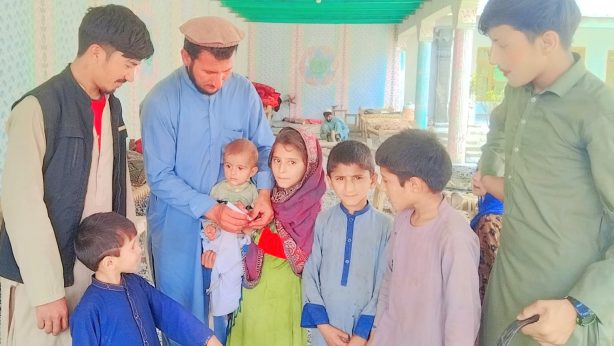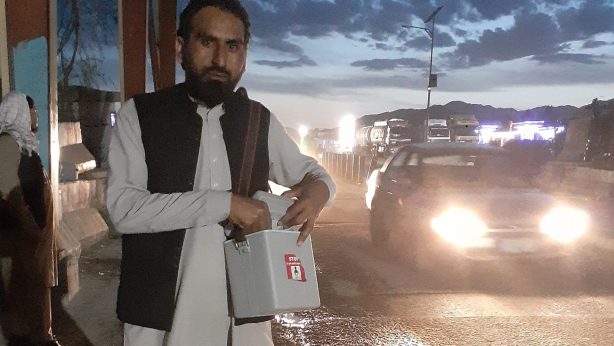Community Leaders’ Role in Polio Eradication: Fighting Rumors and Promoting Vaccination

Raqiba Hamidi
Badakhshan, Afghanistan – In Afghanistan’s local communities, especially in remote areas, the role of elders, leaders, and influential figures in shaping people’s decisions and behaviors is crucial. These leaders, through the trust and close connections they have within the community, play a vital role in encouraging people to get vaccinated against polio.
Juma Khan, a local leader in Faizabad city, Badakhshan, says, “As a community leader, it is my duty to reassure people that the polio vaccine is effective and beneficial. When people see me vaccinating my own children, they are encouraged to vaccinate their children as well.”
He believes that community leaders, by using their social status, can correct false beliefs and reassure people that the polio vaccine is safe and essential.
Regarding the fight against rumors, he says: “Sometimes people fall prey to doubts and rumors about the vaccine. We dispel these doubts by organizing meetings in mosques, visiting families individually, and participating in vaccination campaigns to shape their mindsets.”
In Juma Khan’s view, the presence of leaders in vaccination campaigns increases public trust and helps reduce the number of vaccines refusing families.
Supporting Vaccinators in Campaigns
Sahra Saba, a female vaccinator from the Bagh-e Shah area of Badakhshan, highlights the importance of community leaders’ participation and cooperation in polio vaccination campaigns: “Community leaders play a vital role in the effectiveness of our efforts. When they cooperate with us, people are more willing to vaccinate their children, leading to successful campaigns.”
She added that in areas where people refuse to vaccinate their children due to rumors, local leaders play a crucial role in persuading them and expanding the coverage of vaccinations.
Sakina, another vaccinator from the Chashma-e Bed area in the same province, also considers the support of community leaders important, saying, “In remote areas, alongside other challenges, people’s misconceptions about vaccines are a major hurdle. However, with the support of community leaders, we have been able to overcome these challenges and reach every last child.”
 Sahra Saba, a female vaccinator from the Bagh-e Shah area of Badakhshan, highlights the importance of community leaders’ participation and cooperation in polio vaccination campaigns: “Community leaders play a vital role in the effectiveness of our efforts. When they cooperate with us, people are more willing to vaccinate their children, leading to successful campaigns” Polio Free Afghanistan/2024/Raqiba Hamidi
Sahra Saba, a female vaccinator from the Bagh-e Shah area of Badakhshan, highlights the importance of community leaders’ participation and cooperation in polio vaccination campaigns: “Community leaders play a vital role in the effectiveness of our efforts. When they cooperate with us, people are more willing to vaccinate their children, leading to successful campaigns” Polio Free Afghanistan/2024/Raqiba Hamidi
Impact on Families
Qiyamuddin, a resident of the Yaftali area and a father of several children, initially doubted the polio vaccine but says that his mindset changed later.
“The rumors circulating about the polio vaccine made me skeptical, but when the elders provided us with accurate information and assured us that the vaccine was safe and beneficial, I decided to vaccinate my children,” he says
He acknowledged that the advice and reassurance of local leaders played a significant role in his decision to vaccinate his children.
Ziagul, a resident of the Shorabak area and a mother of several children, shares: “At first, I had heard rumors that the polio vaccine was dangerous, but when I saw that local leaders were vaccinating their own children, I became confident that these rumors were false. Since then, I have regularly vaccinated my children.”
Conclusion
In Afghan society, the role of local leaders in the fight against polio is extremely important. They have a notable impact on building public trust, expanding vaccine coverage in remote areas, and preventing the spread of false rumors.


